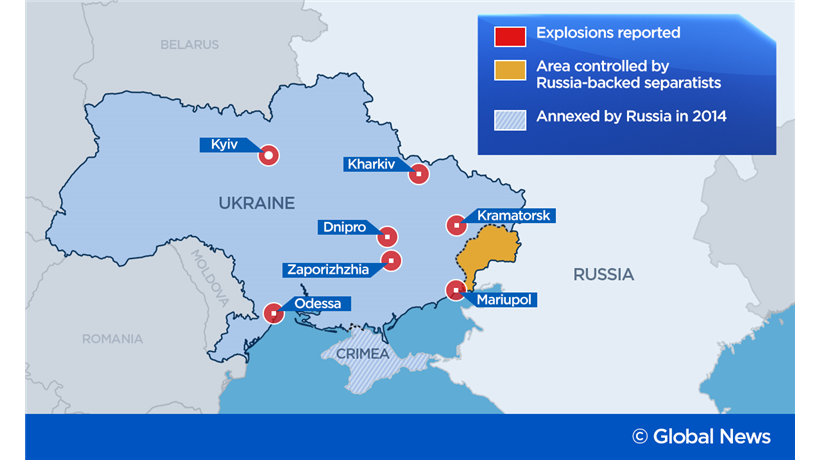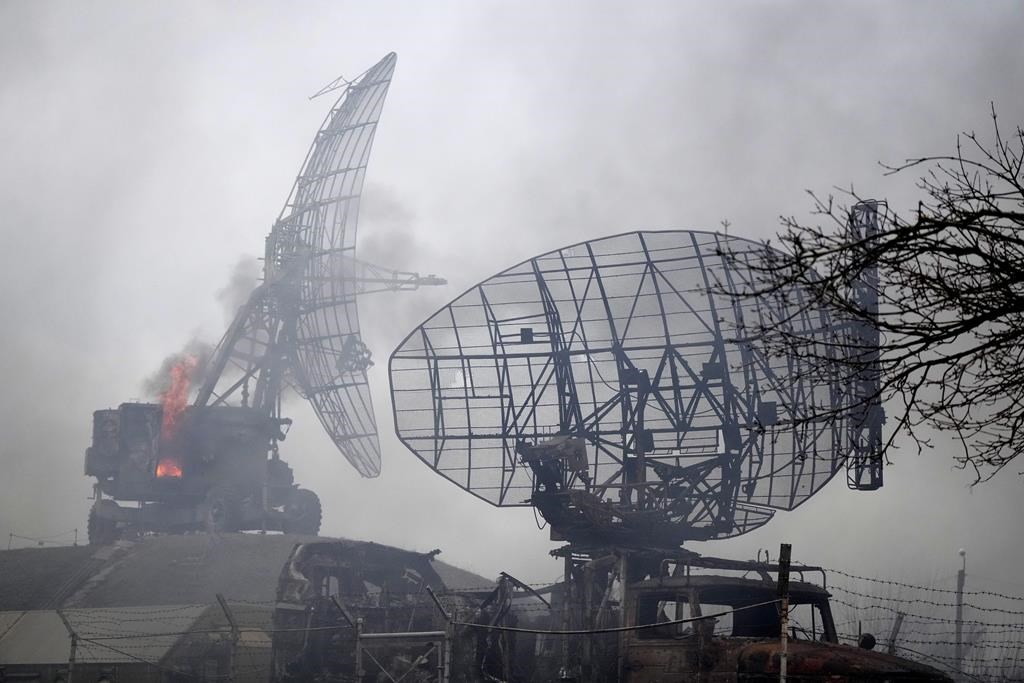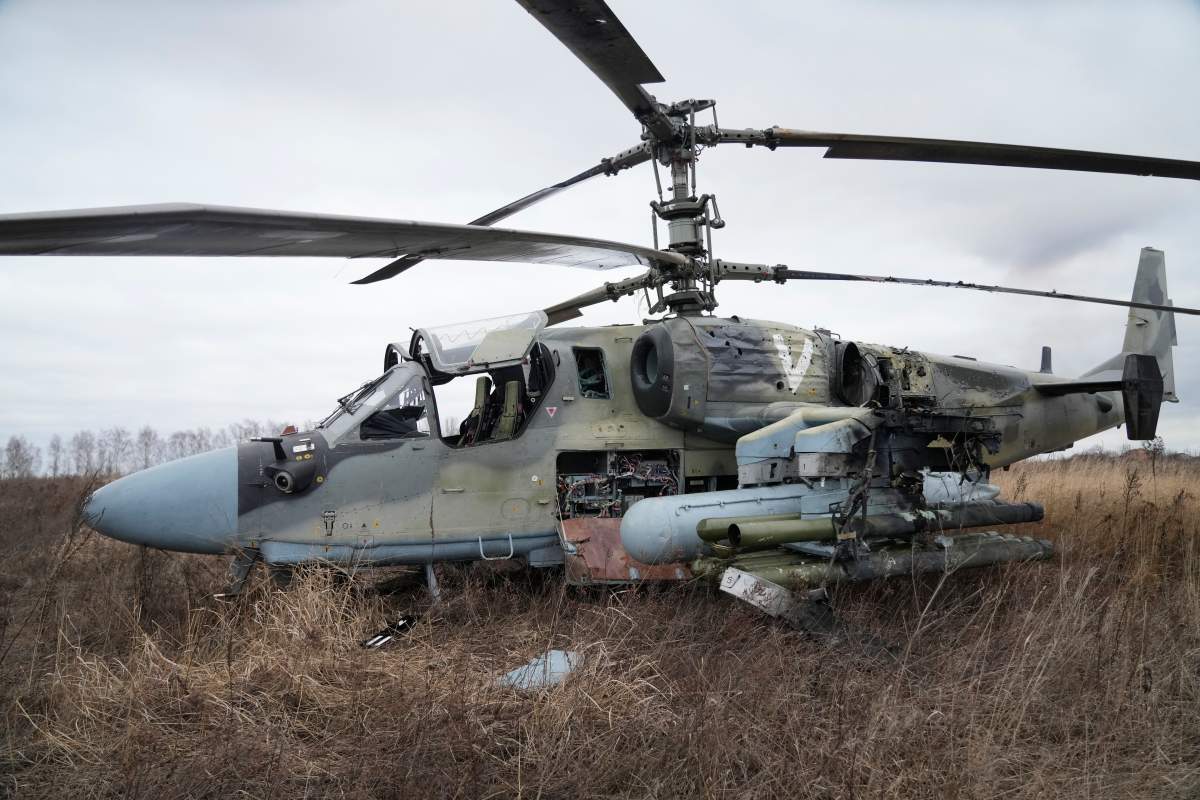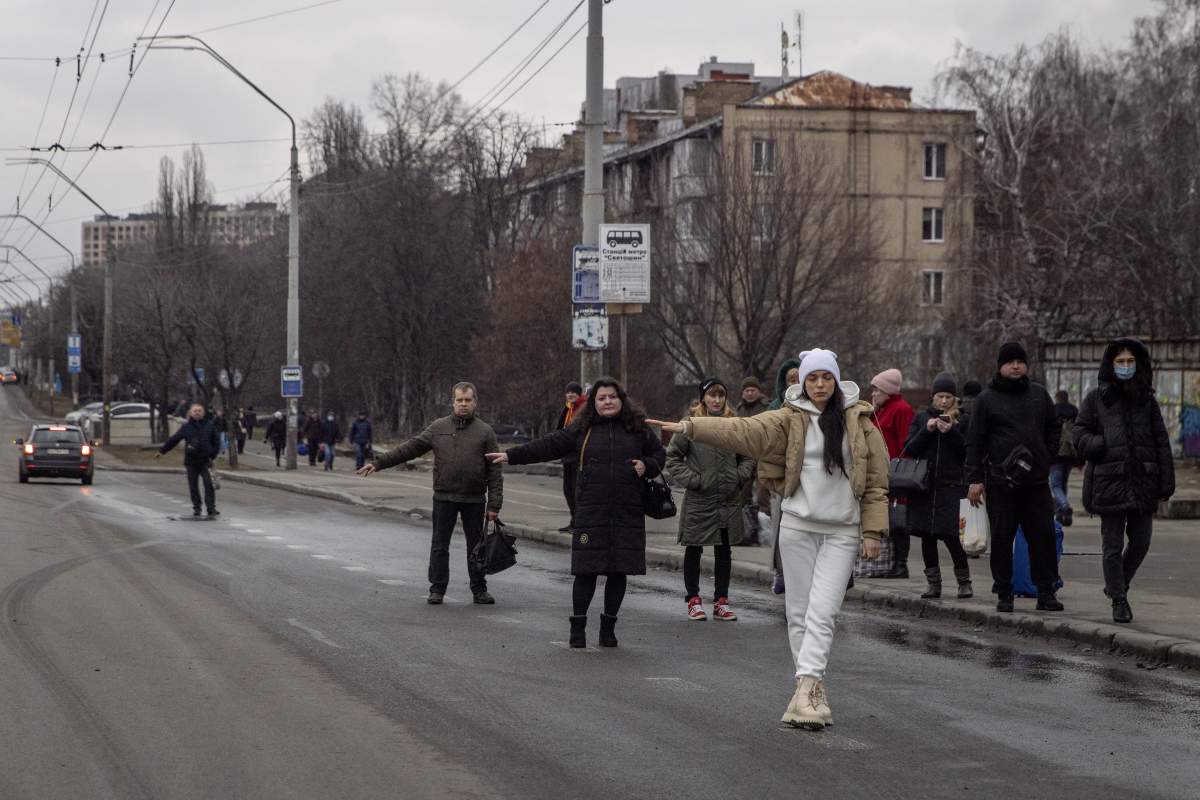For the latest on the invasion: Ukraine says missile strikes on Kyiv have resumed as Russian invasion enters 2nd day

Ukraine’s president has ordered a full military mobilization to counter a Russian invasion that began early Thursday morning.
President Volodymyr Zelenskyy said in a decree issued Thursday that the mobilization will last 90 days.
He has asked the military’s general staff to determine the number of people eligible for service, the number of reservists and the order of call-up. Zelenskyy’s cabinet will allocate money for the mobilization.
It comes after Russian President Vladimir Putin defied international pressure and launched a wide-ranging attack on Ukraine, telling the West not to intervene in what appeared to be the beginning of military conflict in Europe.
Putin said in a morning televised speech the “special military operation,” which he said would occur in eastern Ukraine, was in response to Ukrainian threats while insisting Russia doesn’t have a goal to occupy the country.
Yet several areas throughout Ukraine were targeted by missile strikes — prompting Ukrainians to start fleeing — while Russian forces also landed troops on the country’s south coast, signalling the operation was not limited to the east.
On Friday, Ukraine’s Interior Ministry said it had shot down a Russian aircraft over the capital of Kyiv, after multiple explosions were heard in the city from suspected Russian missile strikes. No casualties have been reported.

Zelenskyy said that 137 civilians and military personnel have been killed so far due to the Russian invasion in a video address released early Friday morning local time. He called them “heroes” and said hundreds more have been wounded.
Despite Russia’s claim that it is only attacking military targets, Zelenskyy said civilian sites have also been struck.
“They’re killing people and turning peaceful cities into military targets. It’s foul and will never be forgiven,” he said.
All border guards on Zmiinyi island in the Odesa region were killed Thursday, Zelenskyy said. Ukraine’s border guard service reported earlier in the day that Russians had taken the island.
The president said he has been marked as Russia’s “number one target” and vowed not to leave Ukraine despite the invasion.
“My family is the number two target,” he said. “They want to destroy Ukraine politically by destroying the head of state.”
“I will stay in the capital. My family is also in Ukraine.”
A map indicating cities in Ukraine that have reportedly been attacked by the Russian military.
Putin said in his address the responsibility for bloodshed lies with the Ukrainian “regime,” telling fighters there to lay down their arms and surrender — though he admitted clashes between Russian and Ukrainian forces are “inevitable” and “only a question of time.”
The Russian leader warned other countries that any attempt to interfere with the Russian action would lead to “consequences they have never seen.”
Canada announces new sanctions against Russia, condemns invasion of Ukraine
In a speech on Thursday afternoon, Prime Minister Justin Trudeau called the Russian invasion of Ukraine a “horrific, unprovoked attack.”
Putin’s action “put the lives of innocent people at risk, violated Russia’s international treaties, and launched the greatest threat to European stability since WWII,” Trudeau said adding Putin’s disregard for international law and democracy are a “massive threat to security and peace around the world.”
During his remarks, the prime minister noted that he had spoken with Ukrainian President Volodymyr Zelenskyy and continues to “stand with him and the Ukrainian people.”
Trudeau also said that he had met with fellow G7 countries to coordinate a response and that Canada was working closely with NATO and other allies.
“Together, we have made clear that Russian violence, aggression, and violation of international law will not go unpunished,” he said.
Deputy Prime Minister Chrystia Freeland, who is Ukrainian-Canadian, also spoke at the press conference and said history will not remember Putin kindly.
“Today, he cements his place in the ranks of the reviled European dictators who caused such carnage in the twentieth century,” Freeland said.
Trudeau was asked if the west was at war and if Canada was prepared to fight alongside its allies. The prime minister did not directly answer the question, but said Russia’s aggression would receive a response in kind.
“What Russia is doing is terrible and wrong and would be met firmly and forcefully with a response that will punish Russia,” he said.

Russia’s actions could be an “extremely serious challenge” to the post-Second World War international rules-based order which has been aimed at limiting serious conflicts, Freeland said.
“If Russia succeeds, then that order will be breached and we can’t let that happen. We can’t let that happen because that would be devastating for the world,” Freeland said.
Canada was integral to helping build that rules-based order and there were significant lives lost, Freeland said. She noted that because Canada is a “middle country” and our stature in the world is similar to Ukraine, the country needs to unequivocally be against what Russia is doing.
“All of us said today that the people of Ukraine are fighting for their own democracy and their own sovereignty, but they’re fighting for all of us and that’s why we need to support them,” Freeland said.
Canada is home to the third most populous Ukrainian community outside the two countries embroiled in the ongoing conflict. During her speech, Freeland spoke directly to Ukrainian-Canadians and urged them to be together during this time.
“Now is the time for us to be strong as we support our friends and family in Ukraine. Now is the time for us to remember,” Freeland said.
The new sanctions target “58 individuals and entities,” including Russian oligarchs and their family members. The sanctions also target the Wagner Group and major Russian banks, as well as blocking exports destined for Russia that require permits.
Those sanctions can be broken down to 31 individuals and 27 “entities,” according to Sandra McCardell, an assistant deputy minister with Global Affairs Canada. Those entities include banks, oil and gas companies, defense, transportation, telecom and a diamond company.

Get daily National news
“Certainly what Canada did today sent a very clear message,” she said.
McCardell said that Canada’s actions have been done “in concert” with allies, which will make their effect greater.
Regarding sanctions, Minister of Foreign Affairs Melanie Joly said that hundreds of permits in the aerospace, IT and minerals sector are being cancelled and the total hit would be more than $700 million.
“There will be other sanctions coming,” Joly said.
Armed conflict breaks out between Russia and Ukraine
Earlier in the day, President Zelenskyy called on Russia to end its attack on Ukraine.
“It wasn’t Ukraine that chose the path of war, but Ukraine is offering to go back to the path of peace,” he said.
Zelensnkyy added that the Russian aerial attack at Hostomel airport just outside Kyiv was stopped. He noted that a number of Russian aircraft and armoured vehicles have been destroyed, but did not offer specifics.

Ukraine’s second-largest city, Kharkiv, just 20 kilometres from the Russian border is in a difficult situation, according to Zelenskyy. In the northern part of the country, Russians are moving towards Chernihiv, he confirmed.
Ukraine officials also said they had lost control of the decommissioned Chernobyl nuclear power plant, scene of the world’s worst nuclear disaster, after Russian troops seized it.
The White House expressed outrage at “credible reports” from Ukrainian officials that staff at the plant have been taken hostage by Russian troops.
Press secretary Jen Psaki said the U.S. had no assessment on the state of the plant where radioactivity is still leaking decades after the worst nuclear disaster in history. But she said hostage taking could hamper efforts to maintain the nuclear facility and was “incredibly alarming and greatly concerning.”
With the attacking forces moving fast, Zelenskyy added that world leaders need to move — and quickly.
“If you don’t help us now, if you fail to offer strong assistance to Ukraine, tomorrow the war will knock on your door,” he said.
Zelenskyy declared martial law shortly after the attacks began and confirmed Russia has targeted Ukraine’s military infrastructure. He urged citizens not to panic and to “stay at home if you can.”
He later cut diplomatic ties with Russia and appealed for help fighting “the aggressor” from world leaders and even his own citizens, promising weapons to anyone in the country who needed them.
During and immediately after Putin’s announcement, explosions and gunfire were reported throughout Ukraine around dawn — including the separatist regions of Donetsk and Luhansk — followed later in the morning by air raid sirens.
About three hours after Putin’s speech, Ukraine’s State Emergency Service said multiple military units and airfields had been damaged by shelling. The Russian military said it destroyed 74 Ukrainian military facilities, including 11 airbases.

The Ukrainian military claimed it had shot down six Russian planes and one helicopter over its Luhansk region.
Russian helicopters on Thursday attacked Gostomel, a military airport near the capital of Kyiv, and Ukraine downed three helicopters, Ukrainian officials said.
Ukrainian border officials said that the Russian military was trying to penetrate into Ukraine’s Kyiv region and its Zhytomyr region on the Belarusian border.
Just after noon local time, officials with Ukraine’s presidential office confirmed a “second wave” of missile strikes had begun to hit the country.
Ukraine’s border guard agency alleged Belarus was supporting Russian troops’ attacks on border units and checkpoints, with troops entering Ukraine from Belarus.
The Kremlin said Putin has spoken to Belarusian President Alexander Lukashenko after the military operation began. Lukashenko publicly denied Belarus was providing military support, but said troops could take part in Russia’s operation if needed.
The border guard said separately Russian military columns have crossed the Ukrainian border into the Chernihiv, Kharkiv and Luhansk regions. The agency has reported at least four border agents have been killed in the fighting.
Security camera footage released by the border guards showed a line of Russian military vehicles crossing into Ukraine from Russian-annexed Crimea.
A Ukrainian presidential adviser told the Associated Press that Russian forces have launched an attack on Ukraine from the north, east and south. The adviser, Mykhailo Podolyak, said “the Ukrainian military is fighting hard.”
“Russia’s key goal is clear: to oust the Ukrainian leadership and stir up as much panic as possible,” he said.
He added the Chernobyl nuclear power plant was captured by Russian forces, Reuters reported.
Ukraine’s military chief, Valerii Zaluzhnyi, said Ukrainian troops are fighting the Russian army near the Hostomel airbase seven kilometres northwest of Kyiv. He added in the south, fighting was going on near Henichesk, Skadovsk and Chaplynka.
An Associated Press photographer in Mariupol reported hearing explosions and seeing dozens of people with suitcases heading for their cars to leave the city.
Dozens of cars were queuing on the border between Ukraine and Moldova, according to Moldovan media websites. Dozens more were reportedly arriving at the Polish border, with foot traffic also increasing in bordering Romania and Slovakia.
President Maia Sandu on Thursday said Moldova would introduce a state of emergency and was ready to accept tens of thousands of people coming in from Ukraine. Moldova’s interior ministry later said it has set up two temporary centres to manage an influx of refugees.
Ukraine closed its airspace to civilian flights on Thursday, citing a high risk to safety, while Europe’s aviation regulator also warned against the hazards to flying in bordering areas of Russia and Belarus, because of military activities.
Russia said on Thursday it had suspended domestic flights to and from several airports near its border with Ukraine, including Rostov-on-Don, Krasnodar and Stavropol, until March 2.
Reuters reported Russia has suspended the movement of commercial vessels in the Azov sea until further notice, which was later confirmed by local media citing the state agency for maritime and river transport.
Ukraine and Russia both have ports on the Sea of Azov, including Ukraine’s major port of Mariupol, while Russia controls the sea’s mouth at the Kerch Strait.

What are sanctions?
Russia’s invasion of Ukraine was followed by swift criticism from western nations, with leaders promising more “severe sanctions” against Moscow.
G7 leaders met on Thursday and said in a joint statement they are “bringing forward severe and coordinated economic and financial sanctions” against Russia.
U.S. President Joe Biden announced a new series of sanctions Thursday that include restrictions on exports to Russia and sanctions on Russian banks and state-controlled companies.
“Today I’m authorizing additional strong sanctions and new limitations on what can be exported to Russia,” Biden said. “This is going to impose severe cost on the Russian economy both immediately and over time.”
Russian banks that together hold around $1 trillion in assets have been sanctioned from the U.S. financial system.
“Every asset they have in America will be frozen,” Biden said, adding Russian elites and their family members will also be sanctioned.
Biden said in a video address that Putin is the “aggressor” and he “chose this war.” He highlighted how the U.S. has been “transparent with the world” and shared Russian plans of false pretexts, “so that there can be no confusion or cover up.”
The U.K. government announced a set of new sanctions on Thursday in response to the invasion.
The sanctions include freezing the assets of all major Russian banks, including VTB Bank, the nation’s second-biggest bank, Prime Minister Boris Johnson said Thursday. Britain also plans to bar Russian companies and the Russian government from raising money on U.K. markets.
Britain will also ban the export of a wide range of high-tech products, including semiconductors, to Russia and bar the nation’s flagship airline, Aeroflot, from landing at U.K. airports.
Foreign Affairs Minister Melanie Joly said Canadian diplomatic staff working in Ukraine have been relocated to Poland. Joly cited the “security situation in Ukraine” as the move to relocate staff.
Joly’s office also told The Canadian Press the minister summoned Russian ambassador Oleg V. Stepanov at the headquarters of Global Affairs Canada, where she condemned “in the strongest possible terms Russia’s egregious attack on Ukraine.”
Joly told Stepanov that Russia has violated Ukraine’s sovereignty, territorial integrity and independence
Canada’s chief of the defence staff, General Wayne Eyre, said in a statement Thursday that Russia’s invasion represents “the return of history,” and warned that it will result in “changes to the geopolitical situation that will reverberate for years to come.”
“The world has just become a much more dangerous place, and we must do all that we can to stand as one and be ready,” he said.
Vice-Admiral Bob Auchterlonie, the Commander of the Canadian Joint Operations Command, said that Russia conducted a “well co-ordinated and planned invasion of Ukraine” that has seen months of preparation for the “multi-pronged” attack.
Auchterlonie said that there currently are no Canadian armed forces personnel on the ground in Ukraine.
Personnel a part of Operation Unifier, which had up to 200 Canadian troops in Ukraine training the country’s forces, have either returned to Canada or have gone to Poland, Auchterlonie said.
While Canada ultimately hopes to return troops to Ukraine to resume training, Russia’s invasion has made that possibility “rather bleak,” he said.
Canada will also deploy 460 personnel in addition to the roughly 800 currently employed in Europe in support of NATO, Auchterlonie said. He said there is also a brigade at “high readiness,” while the situation at Ukraine’s border has become “more and more tense.”
“We stand ready to support the NATO alliance should our nation call on the personnel sailors, soldiers, aviators and operators of the Canadian Armed Forces,” he said.
'False flag' led to attacks
A full-blown Russian invasion could cause massive casualties and topple Ukraine’s democratically elected government. And the consequences of the conflict and resulting sanctions levied on Russia could reverberate throughout the world, affecting energy supplies in Europe, jolting global financial markets and threatening the post-Cold War balance on the continent.
For weeks, Russia has amassed over 150,000 troops along the border with Ukraine, though continuously denied it was planning to invade. Putin has demanded NATO stop its expansion into eastern Europe and that Ukraine demilitarize — demands Ukraine and the West have rejected.
The prospect of conflict in Ukraine grew louder on Monday after Putin recognized the independence of Donetsk and Luhansk, sanctioned the deployment of troops to the rebel territories and received parliamentary approval to use military force outside the country. The West responded with sanctions.
The Kremlin on Wednesday said rebel chiefs in those regions had requested military help from Russia to counter Ukrainian “aggression.” The announcement immediately fueled fears that Moscow was offering up a pretext for conflict, just as the West had warned, with the U.S. calling the news a potential “false flag.”
A short time later, Zelenskyy rejected Moscow’s claims that his country poses a threat to Russia and said a Russian invasion would cost tens of thousands of lives.
“The people of Ukraine and the government of Ukraine want peace,” he said in an emotional overnight address to his nation in Russian. “But if we come under attack, if we face an attempt to take away our country, our freedom, our lives and lives of our children, we will defend ourselves. When you attack us, you will see our faces, not our backs.”
Zelenskyy said he asked to arrange a call with Russian President Vladimir Putin late Wednesday, but the Kremlin did not respond.
In other developments, Russia evacuated its embassy in Kyiv; Ukraine recalled its ambassador to Russia and considered breaking all diplomatic ties with Moscow and dozens of nations further squeezed Russian oligarchs and banks out of international markets.
The threat of conflict has already shredded Ukraine’s economy and raised the spectre of massive casualties, energy shortages across Europe and global economic chaos.

Furthermore, an armed conflict could trigger a massive refugee crisis, warned Eric Schwartz, president of Refugees International.
“In going to war against Ukraine, Russia is creating a crisis that risks displacement and suffering on a scale that could surpass any seen in Europe in decades,” he said in a statement.
“Millions of people are in danger. As efforts to deter Russia fail, governments of the world must be prepared to provide assistance and protection for people who are forced to flee, as well as those who may become civilian victims of military action.”
— with files from The Canadian Press, The Associated Press and Reuters















Comments
Want to discuss? Please read our Commenting Policy first.